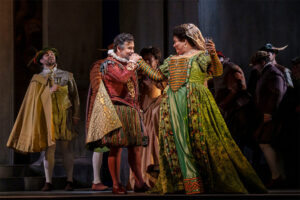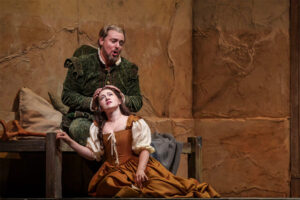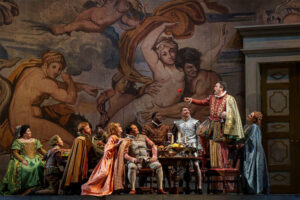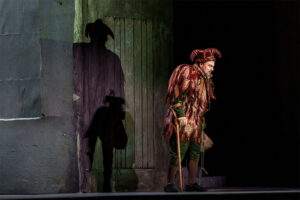
 ***** Giuseppe Verdi’s 1851 Rigoletto has some of the world’s best-known and beloved music. The aria “La donna è mobile,” may be the first thing that comes to your mind when you think of opera, and Rigoletto is performed very frequently around the world. However, that doesn’t mean it can be trotted out with no artistic inspiration and run itself. Looking past that it’s a costume drama set in renaissance Italy, that it’s based on a play by Victor Hugo that makes use of plot contrivances to achieve some extremely overt ironic images, and that its titular character is a hunchbacked court jester who expresses himself through baritone declamations, and you’ll find that it’s a character-driven drama with a small central cast. Director Mary Birnbaum, making her Lyric debut, was interested in the particularities of the society that produced this tragedy, and with her excellent singing actors and Lyric Music Director Enrique Mazzola conducting, Rigoletto shines as a play and not only as music.
***** Giuseppe Verdi’s 1851 Rigoletto has some of the world’s best-known and beloved music. The aria “La donna è mobile,” may be the first thing that comes to your mind when you think of opera, and Rigoletto is performed very frequently around the world. However, that doesn’t mean it can be trotted out with no artistic inspiration and run itself. Looking past that it’s a costume drama set in renaissance Italy, that it’s based on a play by Victor Hugo that makes use of plot contrivances to achieve some extremely overt ironic images, and that its titular character is a hunchbacked court jester who expresses himself through baritone declamations, and you’ll find that it’s a character-driven drama with a small central cast. Director Mary Birnbaum, making her Lyric debut, was interested in the particularities of the society that produced this tragedy, and with her excellent singing actors and Lyric Music Director Enrique Mazzola conducting, Rigoletto shines as a play and not only as music.
The court jester Rigoletto (baritone Igor Golovatenko) is about as bitter a person as is possible to imagine. Serving the youthful Duke of Mantua (tenor Javier Camarena), Rigoletto is a lackey and instigator in public shaming, an object of ridicule for his disability, and as a father-figure and enabler to his own abuser. He is keenly aware of all these failings; he has an aria about them at the top of the first act and is first seen publicly taunting a man whose wife the Duke is flirting with at a party. However, this behavior comes back to bite him when another one of his victims, the nobleman Monterone (baritone Andrew Manea) shows up to put a curse on the Duke, and then puts one on Rigoletto as well. Rigoletto very much believes this sort of thing is powerful, and when the murderer-for-hire Sparafucile (bass Soloman Howard) offers him some preemptive protection, Rigoletto says he’ll think about it.
Rigoletto has one major vulnerability: his daughter, Gilda (soprano Mané Galoyan). Her mother died when she was a baby and Rigoletto only brought her to live in Manua three months ago (we don’t get a clear explanation of where she was before then), and he doesn’t allow her to leave the house except for church. Nonetheless, she’s been discovered twice; by the Duke, who is wooing her under a fake name, and by the courtiers, who assume her to be Rigoletto’s mistress. Rigoletto is right to be worried; bridal kidnappings appear to be normal in this society, and the courtiers are planning to abduct Gilda just to shame him.
Director Mary Birnbaum wrote in her program note that she didn’t want the story to be about how Gilda was just a victim who threw her life away for someone who didn’t deserve it, and in this reviewer’s opinion, it’s not just Gilda who comes across as a stronger character for that. I’ve seen Rigoletto several times, and this is the first production where I thought the Duke’s wonder at the beginning of the second act at whether he is really falling in love with Gilda seemed credible. He was, after all, the only person to notice that the stranger at church was desperately unhappy, and Camarena’s youthfulness lends credit to the idea that the Duke is not fully formed or committed to behaving as a debauched lecher his entire life. Alas, Gilda’s kidnapping causes him to realize that she’s a vulnerability for him, as well, and the way Camarena plays it, “La donna è mobile” seems to be something he has decided he needs to convince himself is true instead of what he has believed since the beginning.
Igor Golovatenko’s Rigoletto is a grim and gloomy man, and also contrary to his occupation, actually quite dignified. Furthermore, he is possessive; during the overture, Gilda looks at mementos from her mother, but she hides them before her father gets home. Rigoletto’s declaration that he turns into a totally different person when he is with his daughter is not supported by what we see of his interactions with her, and having brought her to this dangerous city for unclear reasons, he seems to want her to stay locked up forever. However, he speaks softly with the Duke and is just as deliberate in his movements and honey-voiced as the courtiers. During his famous aria after Gilda is kidnapped, “Cortigiani, vil razza dannata,” he denounces them with as much regal fury as Monterone did earlier, but in this production, he is able to win them over by switching to a reasoned argument and lightening the mood. (He’s a master performer, after all.)
As for Mané Galoyan’s Gilda, she may be naïve, but she’s right that she needs to gamble on something for a chance to escape her awful life. During her aria about the Duke’s assumed identity, “Caro nome che il mio cor,” she cheers herself up with her daring trills, and even after the disappointment of learning the Duke’s identity during her kidnapping, she still braces herself to choose optimism. Though it predates this production, Robert Innes Hopkins’s set is massive and oppressive. The Duke’s erotic frescoes depicting drunken revelry have been subsumed into the castle walls and become just another monument to institutional control. Even the Duke has to escape them to feel truly at ease, and while I won’t spoil a very bold choice Birnbaum makes at the play’s climax, it’s clear how both he and Gilda would have had to completely abandon their socially determined roles to have had a chance together. Rigoletto has thrilling music throughout, and Enrique Mazzola’s conducting is so seamless with the staging that it feels like a completely natural buoy to the story. It’s a treat to see singing actors with such definite takes on their characters master such powerful music. This is one production where the melodramatic aspects heighten the human feeling at the core.

Rigoletto will continue at the Lyric Opera House, 20 N Upper Wacker Drive, Chicago, thru April 7, with the following showtimes:
 September 22: 2:00 pm
September 22: 2:00 pm
September 25: 7:00 pm
September 28: 7:30 pm
October 1: 7:00 pm
October 6: 2:00 pm
Running time is two hours and thirty-five minutes with one intermission. There is also a thirty-minute preview talk an hour before the show.
Performances are in Italian with supertitles.
Ticket prices start at $42. The Lyric offers parking deals with Poetry Garage at 201 W Madison St. if inquired about in advance.
To order, visit LyricOpera.org or call 321-827-5600.
To see what others are saying, visit www.theatreinchicago.com, go to Review Round-Up and click “Rigoletto.”






More Stories
“The Woman in Black” MILWAUKEE reviewed by Amy Menzel
“The Man Who Came To Dinner” reviewed by Julia W. Rath
” Manual Cinema’s The Magic City”